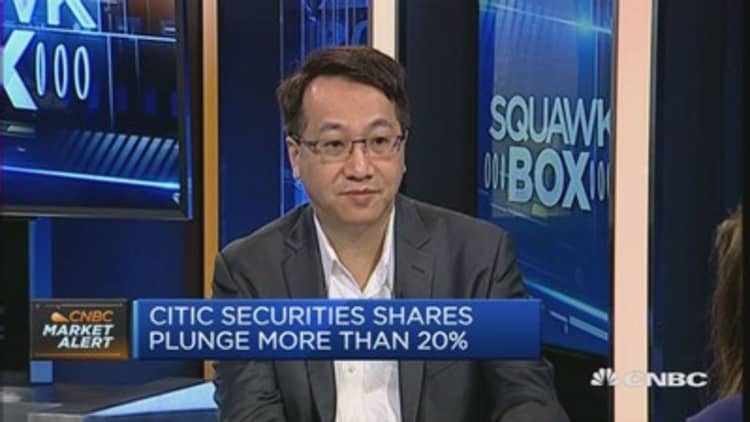China's securities regulator warned there was "panic sentiment" in mainland stocks on Wednesday, saying there had been a surge in "irrational selling" as markets plunged further into bear market territory.
The statement from the China Securities Regulatory Commission (CSRC) did little to soothe investor worries about tumbling equities, with the Shanghai Composite sinking as much as 8 percent in early trade on Wednesday before paring losses to around 5 percent.
Shortly after the regulator's statement, the People's Bank of China (PBoC) said it would closely watch the stock market's direction and guard against systematic regional financial risks, according to a statement on the central bank's website.
China's state asset administrator also urged central government-owned firms to buy their own stock to stabilize share prices, pleading them not to sell during this period of "unusual market volatility."
"This hodge podge of measures that have been undertaken by the government are so conflicted that I think it's causing more confusion in the markets than it is delivering therapy," said Ron Isana, CNBC's senior analyst and commentator.
Read MoreWild ride in markets hits Beijing's credibility
"In the U.S., we're very concerned, we don't like excessive government intervention. The market is still trying to deflate a bubble so why are they trying to prop up a bubble? Nothing looks or smells good there," remarked David Dietze, president and chief investment strategist at Point View Wealth Management.
Meanwhile, more than 500 China-listed companies announced trading halts in Shanghai and Shenzhen on Wednesday, Reuters said, citing an analysis of corporate statements. "More than 51 percent of the 2,776 A-shares has suspended trading today, according to the National Business Daily," echoed Bernard AW, IG's market strategist.
The suspension of trading is a particularly "stupid move," said Alex Wong, director of asset management at Hong Kong-based Ample Capital. People are selling heavily today because they're afraid the stocks they own may also get suspended, he explained.
Officials also said on Wednesday that the China Financial Futures Exchange (CFFEX) would raise the deposit ratio for short positions on CSI500 index futures from 10 to 30 percent, effective Thursday, just a day after the exchange said it would be limiting daily trading on index futures.
In Shanghai, brokerages were among the biggest losers on Wednesday, with Citic Securities and Everbright Securities dropping 10 percent each, despite news that China Securities Finance Corporation (CSFC), a provider of margin financing loan services, would provide adequate liquidity for brokerages.

Other new calming measures were unveiled on Wednesday, in the latest attempt to shore up confidence in a stock market that has slumped 30 percent over the past month.
The country's insurance regulator said that qualified insurers may increase their ratio of equity assets to 40 percent, from 30 percent previously, by buying blue-chip stocks. Meanwhile, the CFFEX is also reportedly stepping up purchases of medium and small cap shares, according to state-owned news media outlet Xinhua.
Read MoreBlame China stock slide for oil's plunge: Analyst
Heavy-handed intervention from Beijing and the PBoC to calm frenzied stock markets in recent weeks, including Tuesday's trading halt for more than 200 companies and a suspension of new share offerings, have been widely interpreted as signs of desperation.
Tumbling stocks could lead to wide-spread contagion in the financial system and even the real economy, as well as hurting Beijing's chances of completing structural reforms like debt deleveraging and revamping state-owned enterprises, experts say.
"This does not bode well for China's hopes to be included in the MSCI indices and it highlights that the Asian giant may not be ready to be an international finance behemoth. There is clearly a lot of work to be done and the latest developments only seek to dent investor confidence," said Bernard Aw, market strategist at IG, in a note.
He calls recent trading halts "stop-gap measures," warning that authorities must announce stronger initiatives to restore stability.
Li-Gang Liu and Raymond Yeung of ANZ Research said in a note that the stock market rout was not yet a systemic crisis, but that it left plenty of room for the PBoC to ease monetary policy further. The analysts forecast a further 25-basis point rate cut and a cut to the reserve requirement ratio of 100 basis points before the end of the year.

